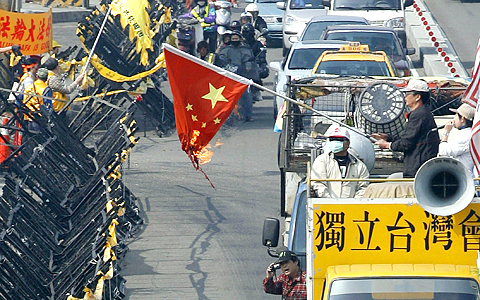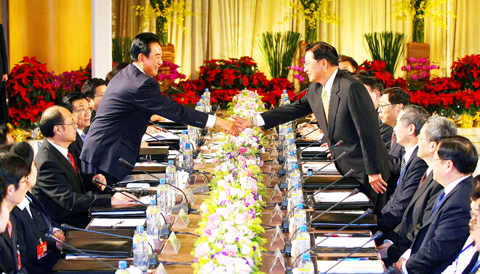Taipei and Beijing yesterday signed three agreements and agreed to place the economic cooperation framework agreement (ECFA) on the agenda at the next round of cross-strait talks next year.
The deals signed yesterday — on the fishing industry, quality checks of agricultural products, and standardizing inspections and certification — bring to 12 the number of pacts inked by the two sides since President Ma Ying-jeou (馬英九) assumed power in Taiwan in May last year.
Yesterday’s agreements were signed by Straits Exchange Foundation (SEF) Chairman Chiang Pin-kung (江丙坤) and his Chinese counterpart, Association for Relations Across the Taiwan Strait (ARATS) Chairman Chen Yunlin (陳雲林), in the afternoon. The two had met in the morning to discuss the agreements as well as the previous nine agreements and one consensus signed at previous talks and the agenda for the next round of cross-strait meetings.

PHOTO: REUTERS
The two sides had planned to sign four agreements yesterday, but a pact on tax matters such as avoiding double taxation was dropped at the last minute because of “technical” problems following a preparatory meeting on Monday.
Both sides said more negotiations were needed and hoped to sign the accord “at an appropriate time.”
Chiang said the three pacts signed yesterday reflected the goal of cross-strait negotiations, which he said was benefiting the public and protecting their rights.

PHOTO: CNA
Chiang and Chen agreed to list the ECFA as the “major issue” for the next round of talks. The other issue was intellectual property rights.
Chiang said signing the ECFA “brooked no delay” because it was the “key” to Taiwan’s economic development and was the “will of the people.”
Chen said the ECFA would be “purely economic” and that various studies had shown its effects would be positive.
“Our attitude on the matter has always been positive,” he said.
Many in the Democratic Progressive Party (DPP) believe Ma’s China-friendly push is setting the stage for an eventual Chinese takeover of Taiwan. The DPP says signing an ECFA would flood Taiwan with cheap Chinese products, prompting massive job losses and making Taiwan overly dependent on China.
Chen said he understood there were different opinions in Taiwan about the pact, but that many Taiwanese businesses were worried about economic integration in the region and wanted to see both sides sign an accord.
Chen said all the agreements signed since the two sides resumed negotiations last year benefited the public.
“Nobody can reverse the trend of peaceful development across the Taiwan Strait,” he said.
Yesterday morning, Chiang also brought up the fact that the previous nine agreements had not been fully implemented.
Chiang said although all of them had produced “substantive results” for the people on both sides of the Strait, there was still room for improvement. This includes increasing the number of Chinese visitors, which he said remained far below the target. The number of direct flights to certain destinations in China should also increase, he said.
He also voiced concern over China’s handling of compensation requests following last year’s melamine scandal. Chinese milk products were found to be contaminated by the industrial chemical, leading to heavy losses for Taiwanese importers, who then filed claims for compensation. Chiang hoped the Beijing would urge and assist local governments to handle the matter.
Furthermore, many white-collar criminals who have fled to China have not been repatriated, he said, hoping to see this situation improve, he said.
Chen said the agreements signed with China may benefit certain industries, but eventually the economic and social benefits would reach the public.
He said both sides over the past 19 months had made great achievements, but that things could not be perfect in such a short period of time. However, both sides had a responsibility to improve, he said.
Chen said he believed the problems could be solved through the good communication established over the past year.
“Some problems have arisen since we signed the agreements. Some agreements have yet to be realized or fully realized,” Chen said. “Everybody thinks we should increase flights. We have already begun consultations on this.”
At the signing ceremony yesterday afternoon, Chiang gave Chen a pottery vase featuring two birds looking at an ear of rice. The SEF said it symbolized peace and prosperity. Chen gave Chiang a framed lacquerware piece from Yangzhou bearing the Chinese characters for peaceful development and featuring peonies to represent the new climate of cross-strait relations and a white dove symbolizing cooperation between the people on both sides and their “strong desire to see peaceful development.”
At a separate setting yesterday, Mainland Affairs Council (MAC) Deputy Minister Liu Te-shun (劉德勳) dismissed speculation that the collapse of talks on dual taxation was related to Taiwan’s sovereignty, saying the issues in question were “technical” in nature.
Liu made the remarks in response to questions about a report in the Chinese-language United Daily News yesterday that said the main hurdle was sovereignty. Liu said he did not know whether to laugh or cry when he read the report.
Liu also rejected a report in the Chinese-language China Times that said President Ma Ying-jeou (馬英九) had known the two sides would not sign the tax deal because SEF Secretary-General Kao Koong-lian (高孔廉) briefed him after returning on Dec. 10 from preparatory talks in Fujian Province, China.
Liu said both sides still hoped to seal the deal during their preparatory meeting on Monday.
But Chiang offered a different story yesterday, saying he believed certain government agencies must have briefed the MAC and “higher officials” on the situation.
Neither the SEF nor ARATS clarified why the tax deal was dropped. Liu denied it had to do with complaints from China-based businesspeople that their interests would be compromised.
Liu said they had hoped to see the agreement take effect on Jan. 1 pending legislative approval and the passage of revisions to Article 25-2 of the Act Governing Relations between the Peoples of the Taiwan Area and the Mainland Area (台灣地區與大陸地區人民關係條例).
An official with the Presidential Office who asked not to be named said the government postponed the tax pact because it did not want to make last-minute compromises over Chinese demands.
The official said the Chinese demands raised “technical” problems pertaining to tax matters and not sovereignty. After considering the demands, the government concluded they were not in Taiwan’s best interest, the official said.
Premier Wu Den-yih (吳敦義) said yesterday he had informed Legislative Speaker Wang Jin-pyng (王金平) of the possible deadlock over the tax agreement when at the legislature last Thursday.
Wu said both sides initially agreed that income tax on China-based Taiwanese businesspeople should be levied according to where they reside, but the Chinese side later demanded imposing tax based on other factors.
“Everyone still disagreed on who gets to tax [Taiwanese businesspeople in China] and on the tax rate,” Wang said later yesterday.
Legislators from across party lines yesterday agreed it was better not to sign the deal at this point, voicing concerns about differences between the tax systems in Taiwan and China and the need to protect personal information.
Chinese Nationalist Party (KMT) caucus secretary-general Lu Hsueh-chang (呂學樟) said the postponement showed that the government had the public’s best interest in mind and that the DPP was wrong to accuse the government of selling Taiwan out.
The DPP yesterday said the postponement was “fortunate” as the deal would have led to annual tax losses of NT$30 billion (US$927 million). The DPP said the decision was the result of pressure from businesses. The government should not have signed the other three agreements either, the DPP said.
ADDITIONAL REPORTING BY SHIH HSIU-CHUAN, FLORA WANG AND AGENCIES

‘FORM OF PROTEST’: The German Institute Taipei said it was ‘shocked’ to see Nazi symbolism used in connection with political aims as it condemned the incident Sung Chien-liang (宋建樑), who led efforts to recall Democratic Progressive Party (DPP) Legislator Lee Kun-cheng (李坤城), was released on bail of NT$80,000 yesterday amid an outcry over a Nazi armband he wore to questioning the night before. Sung arrived at the New Taipei City District Prosecutors’ Office for questioning in a recall petition forgery case on Tuesday night wearing a red armband bearing a swastika, carrying a copy of Adolf Hitler’s Mein Kampf and giving a Nazi salute. Sung left the building at 1:15am without the armband and apparently covering the book with a coat. This is a serious international scandal and Chinese

PERSONAL DATA: The implicated KMT members allegedly compiled their petitions by copying names from party lists without the consent of the people concerned Judicial authorities searched six locations yesterday and questioned six people, including one elderly Chinese Nationalist Party (KMT) member and five KMT Youth League associates, about alleged signature forgery and fraud relating to their recall efforts against two Democratic Progressive Party (DPP) legislators. After launching a probe into alleged signature forgery and related fraud in the KMT’s recall effort, prosecutors received a number of complaints, including about one petition that had 1,748 signatures of voters whose family members said they had already passed away, and also voters who said they did not approve the use of their name, Taipei Deputy Chief Prosecutor

UNDER ATTACK: Raymond Greene said there were 412 billion malicious threats in the Asia-Pacific region in the first half of 2023, with 55 percent targeting Taiwan Taiwan not only faces military intimidation from China, but is also on the front line of global cybersecurity threats, and it is taking action to counter those attacks, President William Lai (賴清德) said yesterday. Speaking at the opening of this year’s Cybersec Expo in Taipei, the president assured foreign diplomats and exhibitors that Taiwan remained committed to strengthening its defense against cyberattacks and enhancing the resilience of its digital infrastructure. Lai referenced a report from the National Security Bureau (NSB) indicating that the Government Service Network faced an average of 2.4 million intrusion attempts daily last year, more than double the figure

COUNTERINTELLIGENCE TRAINING: The ministry said 87.5 percent of the apprehended Chinese agents were reported by service members they tried to lure into becoming spies Taiwanese organized crime, illegal money lenders, temples and civic groups are complicit in Beijing’s infiltration of the armed forces, the Ministry of National Defense (MND) said in a report yesterday. Retired service members who had been turned to Beijing’s cause mainly relied on those channels to infiltrate the Taiwanese military, according to the report to be submitted to lawmakers ahead of tomorrow’s hearing on Chinese espionage in the military. Chinese intelligence typically used blackmail, Internet-based communications, bribery or debts to loan sharks to leverage active service personnel to do its bidding, it said. China’s main goals are to collect intelligence, and develop a